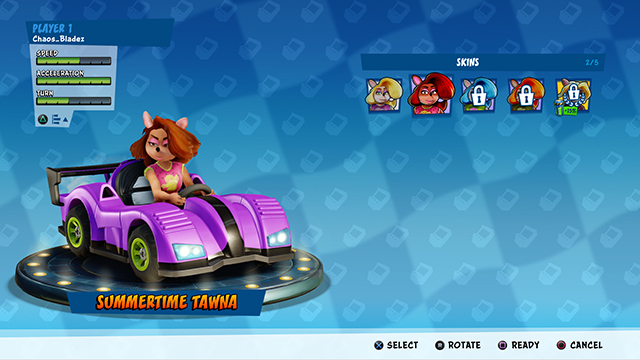Crash Team Racing Nitro-Fueled is a return to the glory days of kart racing but it also may have returned a bit too far into the past with one of its unfortunate skin names. The “Watermelon Tawna” skin caught heat for being “racially insensitive” as it featured Crash’s girlfriend with darker fur and a watermelon shirt. But with the most recent patch, Beenox has renamed the skin to something not as likely to catch ire: Summertime Tawna.

This Watermelon/Summertime Tawna skin was added for the game’s first inaugural Grand Prix season as Tawna and the Nitro Squad were part of its batch of new, playable racers. Although patched into the game on July 3, a popular post on ResetEra on July 6 pointed out the costume and its oversights to a larger audience. The patch that hit the game on July 12 has quietly altered the name of the skin and the change is just under “bug fixes” in the official patch notes.
ALSO: Crash Team Racing Nitro-Fueled Review | A beautiful, fresh coat of paint and tune-up
Some other skins have also been changed. For example, the “White Tawna” skin has been renamed to “White Tiger Tawna.” Other skins with “Black” or “White” in front of them, like “Black N. Tropy” and “Black Zem,” have also been slightly altered.
Beenox never officially responded to the controversial naming but addressed it in just under a week. It was likely an oversight given how quickly it was renamed. We’ve reached out to Activision and will update this article with a response if one comes through.
While it may seem innocent to some, the juxtaposition of the one darker complected skin with watermelon is troubling, given the history of the fruit and its stereotypical association with black people in the United States. The watermelon was first cultivated in Africa and brought to the U.S. via the slave trade. Since free black people sold and grew watermelon after slavery, it was used in racist depictions against them as it was seen as a way of “flaunting” their newfound freedom. It was then weaponized against them and associated with more negative racial stereotypes. Although its origins are over a century old, it still shows up in the modern day.







